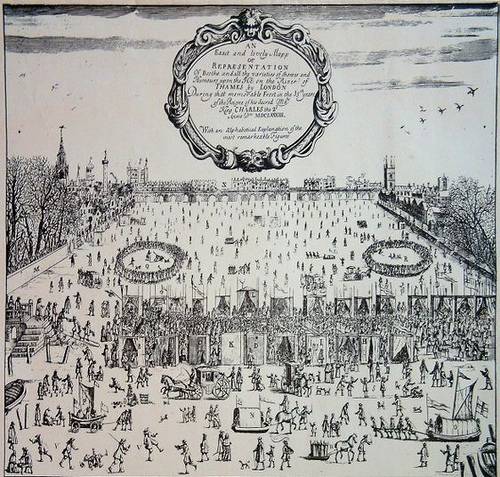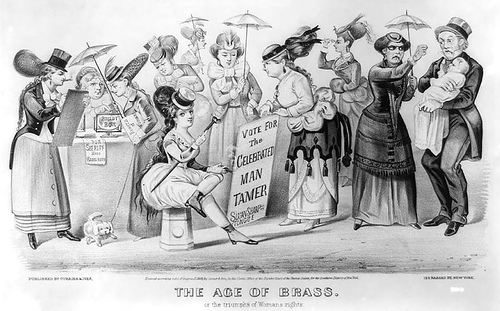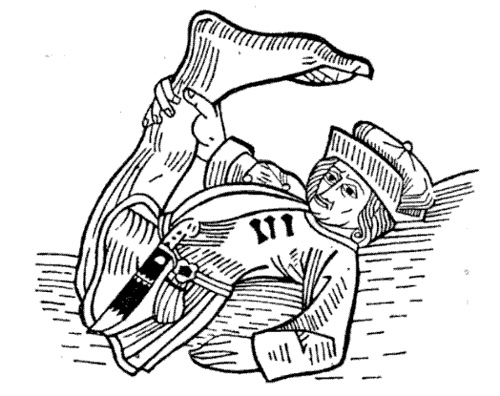The Great Bell of Dhammazedi may have been the largest bell ever made, reportedly weighing 300 metric tons.
Unfortunately, there’s no way to confirm its size — after the Portuguese removed it from a Myanmar temple in 1608, it was lost in a river.
The Great Bell of Dhammazedi may have been the largest bell ever made, reportedly weighing 300 metric tons.
Unfortunately, there’s no way to confirm its size — after the Portuguese removed it from a Myanmar temple in 1608, it was lost in a river.

People were retouching photos long before PhotoShop. In 1938 Nikolai Yezhov, a leader of the Soviet secret police, fell out of favor with Stalin — and literally disappeared.

Being a slave was hard enough in the American South — but wanting to escape was once classified as a psychiatric disorder. In 1851, physician Samuel A. Cartwright of the Louisiania Medical Association decided that runaway slaves suffered from “drapetomania”:
If the white man attempts to oppose the Deity’s will, by trying to make the negro anything else than ‘the submissive knee-bender’ (which the Almighty declared he should be) by trying to raise him to a level with himself, or by putting himself on an equality with the negro; or if he abuses the power which God has given him over his fellow-man, by being cruel to him, or punishing him in anger, or by neglecting to protect him from the wanton abuses of his fellow-servants and all others, or by denying him the usual comforts and necessaries of life, the negro will run away; but if he keeps him in the position that we learn from the Scriptures he was intended to occupy, that is, the position of submission; and if his master or overseer be kind and gracious in his hearing towards him, without condescension, and at the same time ministers to his physical wants, and protects him from abuses, the negro is spell-bound, and cannot run away.
Cartwright wrote that with “proper medical advice, strictly followed, this troublesome practice that many Negroes have of running away can be almost entirely prevented.” But for slaves who were “sulky and dissatisfied without cause,” he recommended “whipping the devil out of them” as a “preventative measure.”

If you’re looking for proof of climate change, consider that Londoners used to hold festivals on the frozen Thames that could go on for weeks. Of the 1683-84 “frost fair,” pictured above, diarist John Evelyn wrote:
Coaches plied from Westminster to the Temple, and from several other stairs too and fro, as in the streets, sleds, sliding with skates, bull-baiting, horse and coach races, puppet plays and interludes, cooks, tippling and other lewd places, so that it seemed to be a bacchanalian triumph, or carnival on the water.
Between 1400 and 1814 there are 23 documented cases of the Thames freezing over. The last fair lasted only four days, though; the climate was changing, and the river ran more swiftly as it was embanked during the 19th century.

The English Benedictine monk Eilmer of Malmesbury saw Halley’s comet as a young boy in 989.
When he saw it again 76 years later, he declared: “You’ve come, have you? … You’ve come, you source of tears to many mothers. It is long since I saw you; but as I see you now you are much more terrible, for I see you brandishing the downfall of my country.”
The year was 1066. That October, with the Battle of Hastings, the Normans began their conquest of England.
Predictions by Scottish mathematician and physicist Lord Kelvin, president of the Royal Society:
Speaking to the British Association for the Advancement of Science in 1900, he said, “There is nothing new to be discovered in physics now; all that remains is more and more precise measurement.” Einstein’s annus mirabilis came five years later.

When Raphael died in 1520, a portrait was found in his studio of a local baker’s daughter named Margherita. She is thought to have been his lover — on his deathbead he had bid her farewell and arranged for her care.
The portrait might reveal something else as well. Writing in The Lancet in 2002, Georgetown University medical professor Carlos Hugo Espinel suggests that “La Fornarina” might have had breast cancer:
There is a bulge in the [left] breast that, beginning inward from the axilla and curving horizontally to the right, slopes gently toward the nipple. This bulge seems to be a mass, oval in shape, puckering just above the tip of La Fornarina’s index finger.
After studying other artworks, Espinel has also concluded that Michelangelo had gout, that Rembrandt died of temporal arteritis, and that the Mona Lisa’s smile may have resulted from the partial paralysis of a facial muscle. Independent research has supported some of these diagnoses.

“Sensible and responsible women do not want to vote.” — Grover Cleveland, 1905

The following story of the Paris Commune was vouched for by an English spectator: “As several Versaillese were being led away to be shot, one man in the crowd that accompanied them to see the shooting made himself conspicuous by taunting and reviling the prisoners. ‘There, confound you,’ said one of the prisoners at last, ‘don’t you try to get out of it by edging off into the crowd and pretending you are one of them. Come back here; the game is up; let us all die together;’ and the crowd was so persuaded that the communard’s vehemence was only assumed to cloak his escape that he was marched into file with the prisoners and duly shot.”
— Charles Bombaugh, Facts and Fancies for the Curious From the Harvest-Fields of Literature, 1905

What John de Mandeville lacked in travel experience, he made up in imagination:
In Ethiope are such men that have but one foote, and they go so fast yt it is a great marvaill, & that is a large fote that the shadow thereof covereth ye body from son or rayne when they lye uppon their backes, and when their children be first borne they loke like russet, and when they waxe olde then they be all blacke.
The writer published a singular book full of such prodigies in the 14th century, most of it apparently borrowed from other writers or spun from whole cloth. Who would do such a thing? We’ll never know — as it turns out, the name “Mandeville” itself was made up.